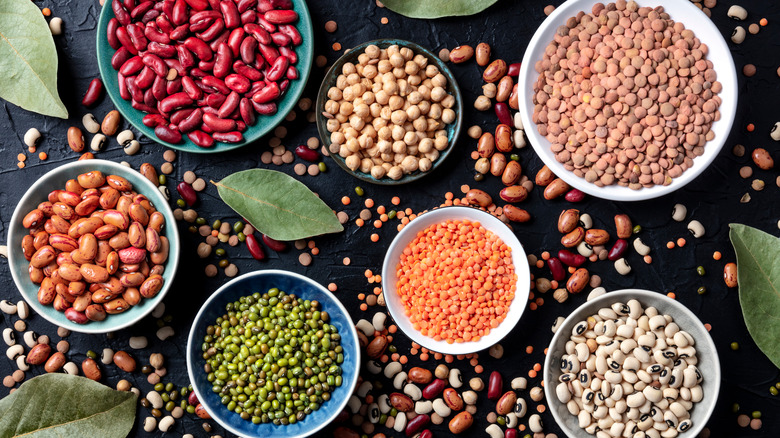What Not To Say To A Vegan
Embracing a vegan lifestyle comes with its challenges. You may need to spend more time in the kitchen, experiment with new foods, and plan your meals. Plus, you'll have to watch out for sneaky non-vegan ingredients like whey protein, casein, beeswax, and gelatin. At the same time, it's important to make sure you're getting enough protein and other key nutrients, such as zinc, calcium, and vitamin B12.
Vegans must also deal with the misconceptions surrounding their lifestyle. For example, they often hear that plant-based diets are not suitable for children. However, vegan children actually get more fiber and less saturated fat than kids who eat meat and dairy, according to clinical research published in the Journal of the American Dietetic Association. Vegan diets are also associated with lower rates of heart disease, cancer, obesity, and other chronic diseases, reports the Physicians Committee for Responsible Medicine.
But, despite these findings, there's still a lot of misinformation about vegan diets. Some claim that it's boring and expensive or that it's impossible to get enough calcium on a plant-based diet. Others simply don't understand this lifestyle and what it entails. With that in mind, here are some things you should never say to a vegan and why.
How do you get enough protein?
Most vegans are tired of hearing comments about their food choices and the nutrients they're missing out on. Contrary to popular belief, plant-based diets can provide more than enough protein. For example, beans deliver 6 to 9 grams of protein per half cup, while edamame boasts up to 18 grams of protein per cup, notes the Cleveland Clinic. Tempeh, whole grains, legumes, nuts, seeds, and nutritional yeast contain ample protein, too.
The recommended daily protein intake is 0.8 grams per kilogram of body weight, reports Harvard Medical School. That's about 54 grams of protein for a 160-pound person or 72 grams for a 200-pound individual. Vegans who eat grains, nuts, and legumes at most meals can get sufficient protein to build muscle, recover from training, and function optimally.
Tennis player Venus Williams, for instance, starts her days with a high-protein vegan smoothie followed by several meals consisting of nuts, quinoa, veggies, and other protein-rich foods, she told The Beet. Professional boxer Mike Tyson, basketball player Chris Paul, American sprinter Elijah Hall, and other top athletes say that veganism helped them overcome injuries and perform at their best.
"Being vegan has helped me immensely," notes Olympic sprinter Morgan Mitchell (via The Beet). "I don't feel sluggish like I did when I was eating meat, and my recovery from training really took off. It felt like an overall cleanse for my body, and I started seeing greater results on the track."
Veganism is expensive
Some people assume that vegans spend a fortune on food, but that's not necessarily the case. Beans, peas, rice, soy, and other vegan staples typically cost less than meat, notes PETA. Plant-based diets are more affordable than flexitarian and pescatarian diets, according to a recent study conducted in 150 countries, reports The Lancet. Eating vegan could reduce food costs by nearly 30%.
If you have a vegan friend, refrain from making comments about their spending habits. Avoid saying things like, "Veganism is expensive," or "You must be spending a lot of money on food." Plant-based milks and other specialty foods can be costly, but many vegans buy food in bulk and cook at home to save money.
Humans are supposed to eat meat
Never say to a vegan that humans were meant to eat meat or that omnivore diets are crucial for health and well-being. First, early humans relied largely on starches, according to the University of Sydney.
"Cooking starchy foods was central to the dietary change that triggered and sustained the growth of the human brain," explains Emeritus Professor Les Copeland. Added researcher Jennie Brand-Miller: "Eating meat may have kick-started the evolution of bigger brains, but cooked starchy foods, together with more salivary amylase genes, made us smarter still."
What's more, research shows that plant-based diets are healthier than omnivore diets. For example, a 2018 study featured in the Journal of the American Heart Association found that vegan eating patterns can reduce inflammation and heart disease risk to a higher extent than a conventional healthy diet that includes meat and dairy.
Another study suggests that vegan diets have beneficial effects on gut flora, causing greater improvements in metabolic health compared to omnivore diets. Plant-based diets also appear to be more effective for weight loss than vegetarian, pesco-vegetarian, and omnivore diets, according to clinical evidence published in the journal Nutrition.
All in all, there's no reason to believe that vegan diets are restrictive, expensive, or unnatural. So, the next time you meet a vegan, refrain from questioning their food choices. It's perfectly fine to show your curiosity, but keep an open mind — and choose your words wisely.



